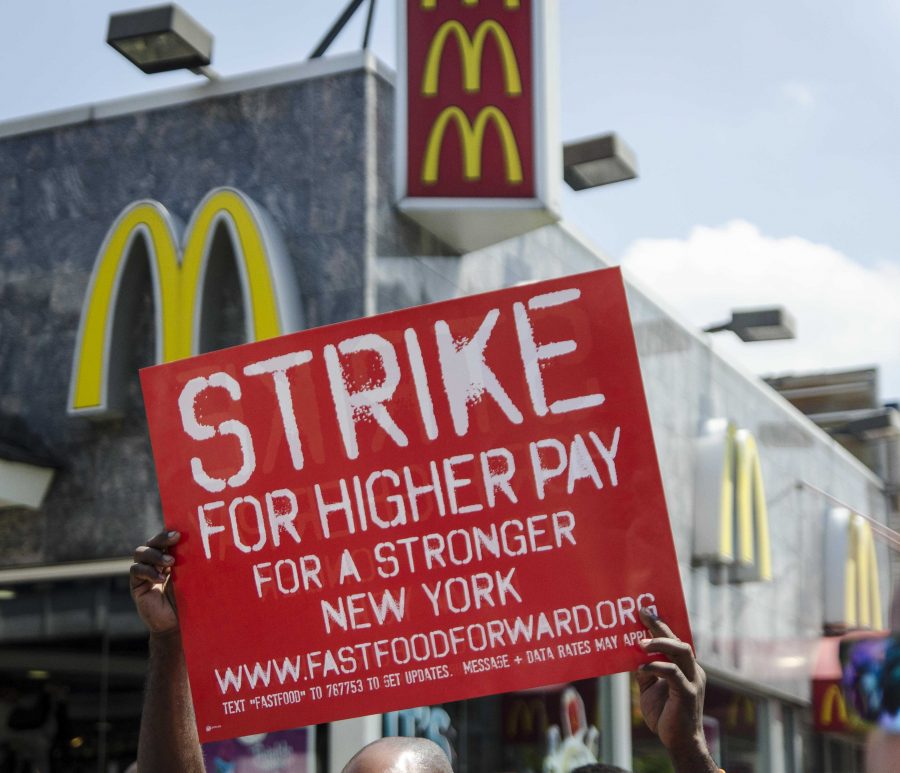Raising the average paycheck: it’s about time, California
photo via wikimedia.org under Creative Commons license
A protester holds up a sign showing his support for a minimum wage increase.
On April 4, California Gov. Jerry Brown signed a bill that raises the minimum wage in California to $15 per hour by 2022. New York Gov. Andrew Cuomo also signed a similar bill, which made New York and California the first states to set forth such an action. According to The Sacramento Bee, Brown was strongly influenced by the public opinion since the public strongly supported raises in minimum wages from the regular $10 per hour. But was raising the statewide minimum wage necessary?
Brown considered the moral aspect of the idea in saying that it “makes sure that parents can take care of their kids in a much more satisfactory way.” This is a good point, for The Sacramento Bee stated that over six million Californians work for a minimum wage salary; yet, by 2022, full-time minimum wage workers will earn an estimated $30,000 per year compared to today’s $20,000. In this way, low income families will have better lives and their children will have better futures as a result.
Daniel Flaming, president of the Economic Roundtable, said in the Los Angeles Times that raising the minimum wage would include an “increased household buying power, a more stable labor force and the affirmation of fairness in an economy where we are all interdependent.” Flaming makes a good point, since raising the minimum wage would serve as a benefit not only to the working class, but to all Californians, establishing a more secure economy. California has an expensive standard of living, and according to PayScale, “the cost of living in Los Angeles is 50 percent above the national average.”
Jared Bernstein of The New York Times emphasized the conspicuous opportunity for the unfortunate, stating that “900,000 who are currently poor would move above the poverty threshold” due to minimum wage increase. Families with low-wage workers, in which 53 percent work for 35 or more hours per week, will find better income and financial support as well.
Although more than 50 percent of American citizens support the minimum wage increase, there are those who do not. Opponents such as Tim Worstall in Forbes says that such an action will cause a rise in prices on everyday products “which are bought by poorer people, not richer…poverty increases as a result.”
He also argues on the proper definition of poverty saying that it’s “defined as living in a poor household…” He uses this fixed definition to support his idea that not all people receiving a minimum-wage income live in poor households, which means that increasing the minimum wage will not target those living in real poverty.
In his article, Worstall focuses only on the fact that poverty will not be removed in raising the minimum wage and the salary increase will not help the poor at all; yet, his limited perspective restricts him from seeing the big picture and how a small raise in salary can have a positive impact. There may be a rise in the prices of everyday products and services, which are produced by minimum-wage workers, but the main purpose of increasing the minimum wage is to help the families that can barely make it in California with a minimum wage salary.
Working students, who are also included in the minimum-wage group, will benefit more from the minimum wage increase. A higher salary indicates higher pay; as a result, students will have better chances of making their education affordable, especially considering the expensive colleges and possible student loans. In addition, they would be encouraged to work harder and become more efficient in their jobs, thereby stabilizing the economy.
Poverty may not be eliminated in California, but at least there will be a financial boost that is bound to satisfy the needs of minimum-wage workers.

Hobbies/Interests: photography, scrapbooking, traveling
Favorite Movie: Maleficent
Favorite Food: Ice Cream
Plans for the future: living a good life...













